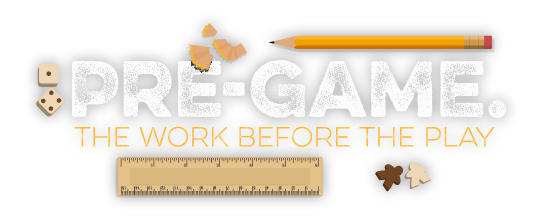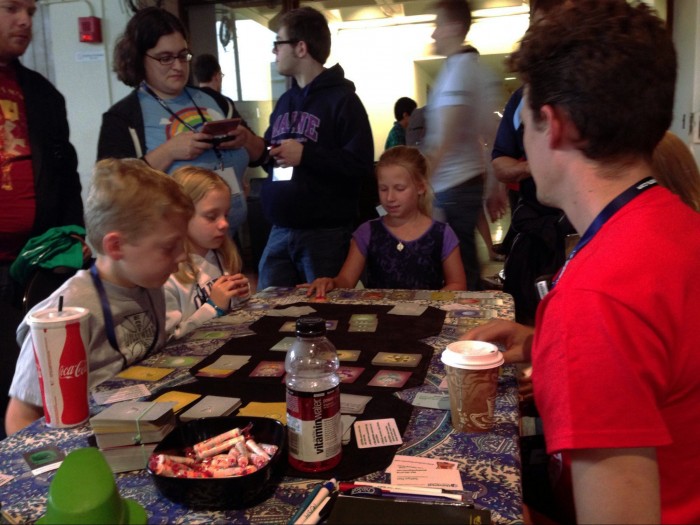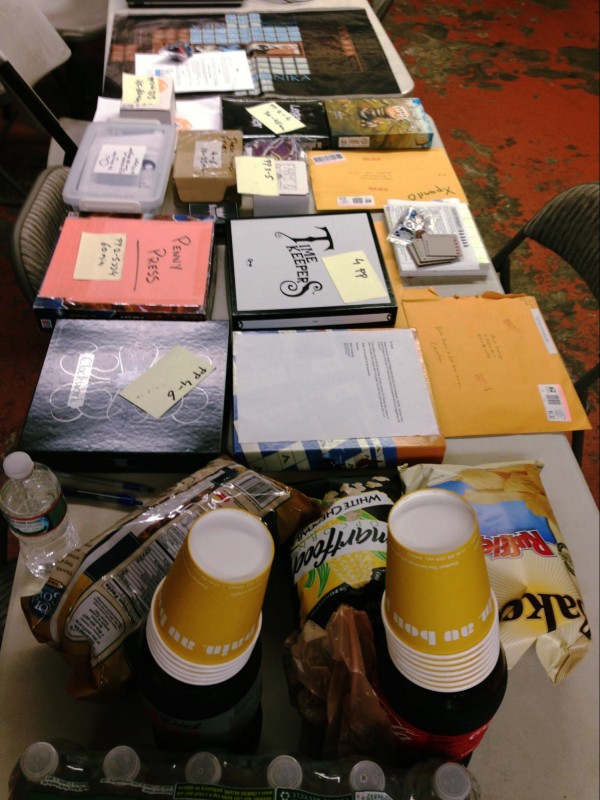
Tell us about yourself – Who are you? What do you do?
My name is Aerjen Tamminga, I’m a game designer and psychologist. I like hanging out with gamers and game designers which is probably why for the past couple of years I’ve been very active in the Indie community. It’s been really great to meet a ton of people from every aspect of the industry and it’s thank to everyone’s support that I was able to publish my first game last year.
Oh and a couple months ago I moved back to the Netherlands where I’m trying to find other game designers to hang out with.
This post has affiliate links, which directly support Andhegames.com at no extra cost to you. If you have any questions about anything recommended, let me know. – Andrew
If I’ve never played your games before, what’s the first one I should try?
Pleasant Dreams. It’s my first successfully published game and it tells you some things about me and my game design philosophy. It’s a competitive dreaming game where you’re trying to get through the night fending of nightmares. The game is quick to play and focuses on out thinking your opponent. The better you are in predicting the other player the more you can mess with them. This meta thinking is something I really enjoy in games and game design. Next to that, I have a big love for art and literature which I think is reflected in the game’s design. The art itself is inspired both by the traditional illustrations from Alice in Wonderland and the 1988 surrealist movie adaptation from Jan Švankmajer.
One fact that we probably don’t know about you:
I’m a VR fanboy and have all kinds of ideas of how to explore human nature by hooking up unsuspecting well informed subjects with VR and biofeedback gear. If any programmers and designers wants to help me out, shoot me an e-mail. We can all take turns at being the mad scientist!
What tabletop games (including digital board/card games) are you playing most right now?
Games that I’m playing for various reasons are: Ligretto (I’m working on a similar game), Kakerlaken Poker (just because I love it), The Isle of Doctor Necreaux (exploring solitaire games) and I’m keen to try out Truths too Terrible which the designers swapped for Pleasant Dreams at PAX East. Other than that I love my Euro games like Power Grid and Caylus, but it’s hard to find the time to sit down with friends.
What are your all-time favorite tabletop games?
I don’t think I really have all-time favorites, since what I like best really depends on the people I’m playing with. Some “classics” I almost always enjoy are Puerto Rico, Kakerlaken Poker, Caylus, Power Grid, Dungeons and Dragons and Hanabi.
What draws you to make games?
I like making people smile and I like making people think. It’s why I’m a psychologist and it’s why I’m a game designer.
What are you not naturally good at, that you’ve learned to do for your work?
Making “ugly” prototypes. I really enjoy art so, it’s been hard for me to let go and just make quick and dirty prototypes. Now that I’m doing that more it’s really sped up the game design process, but sometimes the habit kicks back in.
Describe your process (or lack thereof) when making games. How do you reach your final product?
That really differs per game. Sometimes I start from a mechanic and other times I start with a theme. What is standard procedure is the way I go through playtesting. I start with that as soon as possible by just scribbling some stuff on index cards and moving those around. I iterate until I have something that starts working well which is not necessarily the same as what I originally set out to do. I like to let myself be surprised by what happens in the design process. Once a version seems to make sense and work well enough I start playing the game with others until I’m satisfied with the results. Then I start to focus on looks In this stage I focus on adding some art or symbols that enhance usability. Once the game seems to reach the design goals I set out with (e.g. duration, audience or feel) I move to something I call an intensive playtest. During an intensive playtest I sit down with a group of people and play the game for several hours straight. The goal is to have people learn the game so intimately they start to get ideas for strategies and are better able to break the game in ways that new players that are still learning the rules can’t. After the intensive playtest, I usually get back to the drawing board and iterate some more. If I feel the game is good enough for the next stage, blind playtesting, and see if people can learn the game by just reading the rules. Usually around intensive playtesting I also start upgrading the art to reflect the theme of the game while making sure the usability stays intact. I could go into a lot more detail here, but if you’re interested in learning more you might like reading my game design 101 article that I wrote for Playcrafting.
What game design-related media do you consume on a regular basis?
Mostly these podcast: The Game Design Round Table, Funding the Dream on Kickstarter and Sirlin.net – Game Design. Some podcasts that I’ve started listening to more recently are The State of Games and BoardGameHour. Next to podcasts I’m a member of several Facebook groups on game design and Kickstarter. Let’s see, what else… Ah right, I frequent the websites jamesmathe.com, stonemaiergames.com/kickstarter, gamasutra.com and cardboardedison.tumblr.com a lot. Next to that there are several bloggers and reviewers like @boardgameben and Cardboard Republic that I like to read, but if I start listing those I can keep on going for a while 🙂
What are some tool/programs/supplies that you wouldn’t work without?
Index cards, sharpies, scissors, paper cutters and card sleeves for prototyping. Illustrator, Photoshop and Indesign for graphic work. Google Docs for keeping track of ideas and collaboration. Trello, Slack and Asana for project management. Hootsuite for social media, but I’m still figuring out how to best use that. I really enjoy engaging with people and talking about game design, so whenever I can I try and do that.
What’s your playtesting philosophy? How often/early do you playtest?
As soon as possible, as often as possible and with as many people as possible.
What are some of the biggest obstacles you’ve faced in your work, and how have you overcome them?
Right now it’s finding the time to really sit down and design games next to my other work. Since I moved recently and just switched jobs, I’m still trying to figure out the best rhythm. To be honest, I haven’t got a clue as to how I can best tackle this one yet. So if anyone has suggestions, please drop me a line.
How do you handle life/family/work balance?
Not as well as I’d like :/ Right now I have my own clinical practice in Leiden, work for a company in Amsterdam and live in Tilburg. Commuting between three cities takes up a lot of time. Whenever I can, I try and use some of my time in public transport working on design ideas and handling the business part of game publishing. For me having a daily or weekly rhythm is very important. It might sound contradictory, but the more habits I have, the easier it is for me to break free of them and find the flexibility to do other stuff. Once I’m in a groove it’s easier for me to find the mental space to focus on other things like game design.
How many hours/week do you generally devote to game design? How many to other business-related activities?
Right now, it’s about 2 to 4 hours game design and 4 hours game design business activities. It used to be something closer to 16 hours game design. Hopefully I can ramp that up again in the near future.
What one piece of advice would you give aspiring game designers?
Just sit down and make games and start testing with people you don’t know as soon as possible. Or in other words: get your idea out of your head and on the table!
Who would you like to see answer these questions?
Either Meg or Glenn from Games by Playdate. They really do interesting stuff and I admire their rapid prototyping and an open source development model.
What’s the best advice about life that you’ve ever received?
Allow yourself to keep being surprised by people. As soon as you start assuming you know what others think, life is a lot more boring… Oh and you’ll be wrong… a lot.
___







